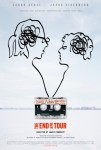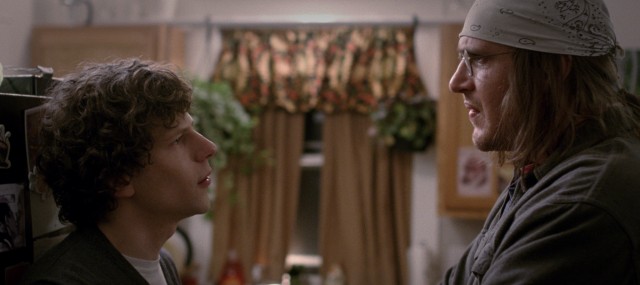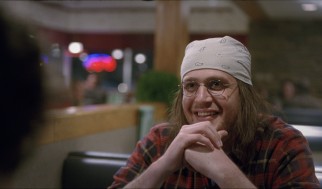The End of the Tour Movie Review
 |
The End of the Tour
Theatrical Release: July 31, 2015 / Running Time: 106 Minutes / Rating: R Director: James Ponsoldt / Writers: Donald Margulies (screenplay), David Lipsky (book) Cast: Jason Segel (David Foster Wallace), Jesse Eisenberg (David Lipsky), Ron Livingston (Bob Levin), Joan Cusack (Patty Gunderson), Anna Chlumsky (Sarah), Mamie Gummer (Julie), Mickey Sumner (Betsy) |
Early moviegoers called films with synchronized soundtracks "talkies" to distinguish them from the silents that had been the standard. You could describe The End of the Tour as a "talkie", End of the Tour adapts Although Of Course You End Up Becoming Yourself, David Lipsky's 2010 book detailing the Midwestern road trip he took with acclaimed author David Foster Wallace in March of 1996. Lipsky (Jesse Eisenberg) has to persuade his editor at Rolling Stone (Ron Livingston) that Wallace (Jason Segel) is worthy of the kind of substantial interview the magazine typically reserves for musicians and actors. Wallace, Lipsky argues, is not just some celebrated writer but the voice of his generation, as some reviews of his 1,000-page novel Infinite Jest have claimed.
The 30-year-old Lipsky, who has just published his first novel, flies out to snow-covered Illinois, where Wallace, 34, lives with two large dogs and teaches English at a state university. Wallace, wrapping up the promotional tour for Infinite Jest, is visibly nervous and uncomfortable answering Lipsky's questions with a tape recorder running. He objects to the journalist interviewing his parents and asks for the right to strike regrettable recently-uttered remarks from the record. Lipsky, who is minimally more at ease, obliges his requests and displays clear interest in and some envy of his subject.
The movie proceeds with these two thirtysomethings exchanging thoughts and ideas. Wallace shows genuine interest in Lipsky and real concern for how his article will portray him. Lipsky snoops around Wallace's medicine cabinet and, against his editor's directions, hesitates to ask about the author's rumored past as a heroin addict. There is only slightly more action here than there was in My Dinner with Andre. We tag along with the two men as they fly to Minneapolis, attend a book signing, catch up with two of Wallace's friends (Mamie Gummer and Mickey Sumner), and visit the Mall of America, where they see the John Travolta/Christian Slater action movie Broken Arrow
The relationship between Wallace and Lipsky evolves. At one point, they seem like great friends. A little later, Wallace appears disgusted by his interviewer and Lipsky is fed up by what he perceives as Wallace's disingenuous effort to paint himself as a normal guy. They bicker, they confide, and they dig deep into the meaning of literary success and the perils of the fame that comes with it. Both men are interesting, intelligent, and complex. Their battles of wits engage, move, and provoke thought.
Director James Ponsoldt continues to grow, improving on the adequate alcoholism drama Smashed and better alcoholism-tinged coming-of-age tale The Spectacular Now. On a movie like this, you've got to have actors who are comfortable carrying the picture. The diagonally billed Eisenberg and Segel are both up to the challenges. Eisenberg is the film's voice, the straight man willing to concede the spotlight while remaining an active participant. Segel is the real revelation, transforming himself to look and sound like Wallace. It's perfectly okay to enter not knowing the author or his books. Even if so, you will leave feeling like you've gotten to know him over the course of these two hours. Segel has put himself out there before in bold and creative comedies, but this dramatic performance is largely unprecedented for him. The film is probably too small and uncommercial to stick around for awards competition, but I don't think that we've seen a richer characterization than this in 2015 so far. The two leads' obvious commitment to the project heightens it and deepens its impact on you, even without any knowledge of these real people.
It was very cool and a tad surreal to see this movie at the Mall of America, where part of it is set and was shot. Cooler still is the fact that Jason Segel appeared for a post-screening Q & A session, giving friendly, humorous, and thoughtful answers to viewer questions about Jeff, Who Lives at Home, playing a real person, the pros and cons of entertainment, and his career choices. This movie represents an exciting development for an actor who has already won over comedy fans, sitcom lovers, and Muppet fanatics.
|
Related Reviews:
DVDizzy.com | DVD and Blu-ray Reviews | New and Upcoming DVD & Blu-ray Schedule | Upcoming Cover Art | Search This Site
DVDizzy.com Top Stories:
Now in Theaters: Irrational Man • Dark Places • Infinitely Polar Bear
Jason Segel: Jeff, Who Lives at Home • I Love You, Man • The Muppets • Bad Teacher • Knocked Up
Jesse Eisenberg: 30 Minutes or Less • Adventureland • The Squid and the Whale • Zombieland • Solitary Man
My Dinner with Andre • Before Midnight • Foxcatcher • Fear and Loathing in Las Vegas • Rum Diary • Philomena • Julie & Julia
Text copyright 2015 DVDizzy.com. Images copyright 2015 A24, Kilburn Media, Anonymous Content, and Modern Man Films.
Unauthorized reproduction prohibited.


